Business Law Assignment - BUMAN103A: Partnership, Contract Law, 2018.2
VerifiedAdded on 2023/06/03
|10
|2074
|456
Homework Assignment
AI Summary
This assignment solution addresses three key areas of business law: partnership, contract formation, and breach of contract. The first question examines the liability of partners in a business transaction, focusing on agency relationships and the Partnership Act 1892 (NSW). The second question analyzes contractual terms, differentiating between pre-contractual representations and terms, and applies case law like Oscar Chess Ltd v Williams to determine the nature of specific terms. The final question delves into conditions and warranties within a contract, assessing the significance of specific terms and the remedies available for breach, referencing relevant legal principles and illustrating the application of these principles through the provided case scenarios, using the IRAC method (Issue, Rule, Application, Conclusion).

qwertyuiopasdfghjklzxcvbnmqwe
rtyuiopasdfghjklzxcvbnmqwertyu
iopasdfghjklzxcvbnmqwertyuiopa
sdfghjklzxcvbnmqwertyuiopasdfg
hjklzxcvbnmqwertyuiopasdfghjkl
zxcvbnmqwertyuiopasdfghjklzxcv
bnmqwertyuiopasdfghjklzxcvbnm
qwertyuiopasdfghjklzxcvbnmqwe
rtyuiopasdfghjklzxcvbnmqwertyu
iopasdfghjklzxcvbnmqwertyuiopa
sdfghjklzxcvbnmqwertyuiopasdfg
hjklzxcvbnmqwertyuiopasdfghjkl
zxcvbnmqwertyuiopasdfghjklzxcv
bnmqwertyuiopasdfghjklzxcvbnm
qwertyuiopasdfghjklzxcvbnmqwe
rtyuiopasdfghjklzxcvbnmrtyuiopa
Running Head: BUSINESS AND CORPORATION LAW 0
Business law
10/14/2018
Student’s Name
rtyuiopasdfghjklzxcvbnmqwertyu
iopasdfghjklzxcvbnmqwertyuiopa
sdfghjklzxcvbnmqwertyuiopasdfg
hjklzxcvbnmqwertyuiopasdfghjkl
zxcvbnmqwertyuiopasdfghjklzxcv
bnmqwertyuiopasdfghjklzxcvbnm
qwertyuiopasdfghjklzxcvbnmqwe
rtyuiopasdfghjklzxcvbnmqwertyu
iopasdfghjklzxcvbnmqwertyuiopa
sdfghjklzxcvbnmqwertyuiopasdfg
hjklzxcvbnmqwertyuiopasdfghjkl
zxcvbnmqwertyuiopasdfghjklzxcv
bnmqwertyuiopasdfghjklzxcvbnm
qwertyuiopasdfghjklzxcvbnmqwe
rtyuiopasdfghjklzxcvbnmrtyuiopa
Running Head: BUSINESS AND CORPORATION LAW 0
Business law
10/14/2018
Student’s Name
Paraphrase This Document
Need a fresh take? Get an instant paraphrase of this document with our AI Paraphraser
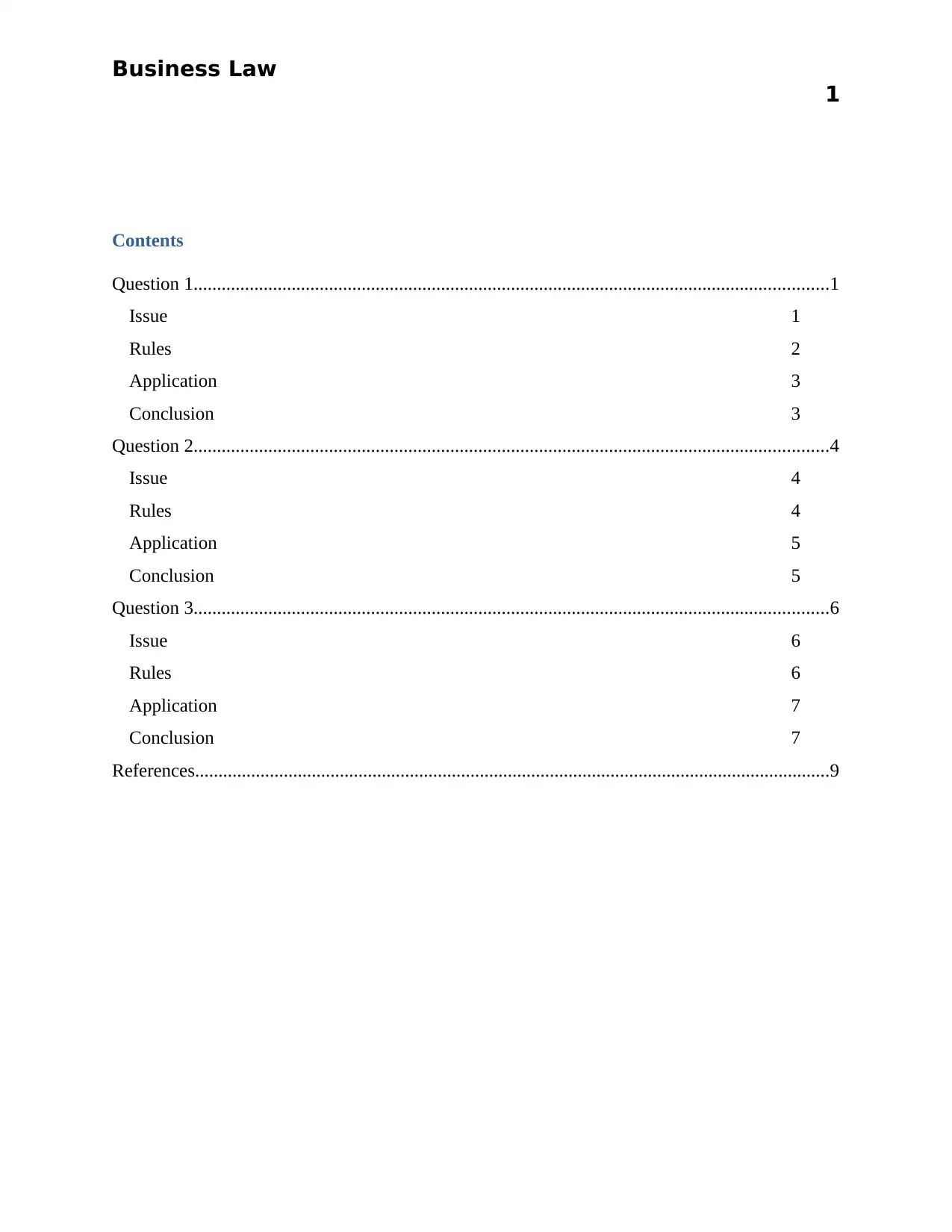
Business Law
1
Contents
Question 1........................................................................................................................................1
Issue 1
Rules 2
Application 3
Conclusion 3
Question 2........................................................................................................................................4
Issue 4
Rules 4
Application 5
Conclusion 5
Question 3........................................................................................................................................6
Issue 6
Rules 6
Application 7
Conclusion 7
References........................................................................................................................................9
1
Contents
Question 1........................................................................................................................................1
Issue 1
Rules 2
Application 3
Conclusion 3
Question 2........................................................................................................................................4
Issue 4
Rules 4
Application 5
Conclusion 5
Question 3........................................................................................................................................6
Issue 6
Rules 6
Application 7
Conclusion 7
References........................................................................................................................................9
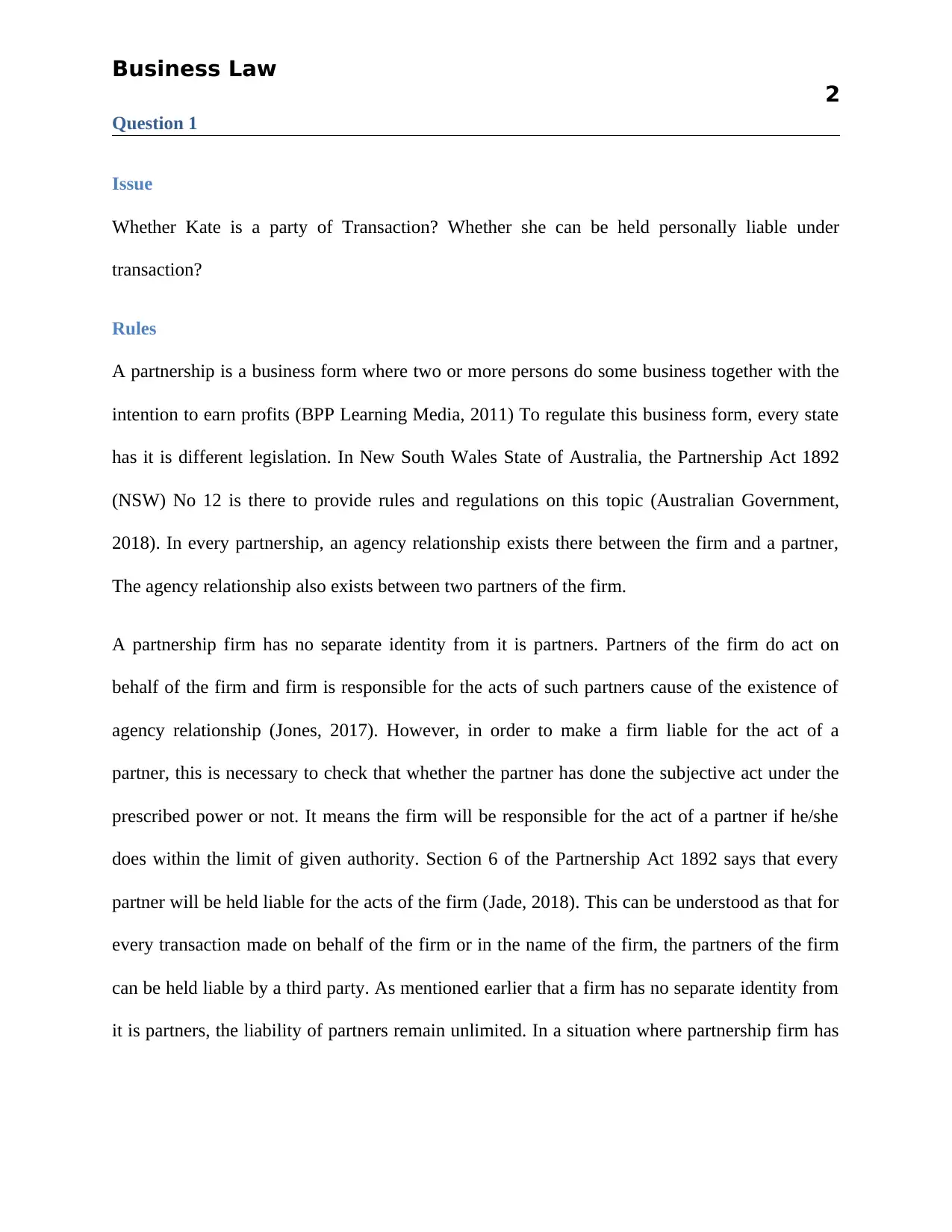
Business Law
2
Question 1
Issue
Whether Kate is a party of Transaction? Whether she can be held personally liable under
transaction?
Rules
A partnership is a business form where two or more persons do some business together with the
intention to earn profits (BPP Learning Media, 2011) To regulate this business form, every state
has it is different legislation. In New South Wales State of Australia, the Partnership Act 1892
(NSW) No 12 is there to provide rules and regulations on this topic (Australian Government,
2018). In every partnership, an agency relationship exists there between the firm and a partner,
The agency relationship also exists between two partners of the firm.
A partnership firm has no separate identity from it is partners. Partners of the firm do act on
behalf of the firm and firm is responsible for the acts of such partners cause of the existence of
agency relationship (Jones, 2017). However, in order to make a firm liable for the act of a
partner, this is necessary to check that whether the partner has done the subjective act under the
prescribed power or not. It means the firm will be responsible for the act of a partner if he/she
does within the limit of given authority. Section 6 of the Partnership Act 1892 says that every
partner will be held liable for the acts of the firm (Jade, 2018). This can be understood as that for
every transaction made on behalf of the firm or in the name of the firm, the partners of the firm
can be held liable by a third party. As mentioned earlier that a firm has no separate identity from
it is partners, the liability of partners remain unlimited. In a situation where partnership firm has
2
Question 1
Issue
Whether Kate is a party of Transaction? Whether she can be held personally liable under
transaction?
Rules
A partnership is a business form where two or more persons do some business together with the
intention to earn profits (BPP Learning Media, 2011) To regulate this business form, every state
has it is different legislation. In New South Wales State of Australia, the Partnership Act 1892
(NSW) No 12 is there to provide rules and regulations on this topic (Australian Government,
2018). In every partnership, an agency relationship exists there between the firm and a partner,
The agency relationship also exists between two partners of the firm.
A partnership firm has no separate identity from it is partners. Partners of the firm do act on
behalf of the firm and firm is responsible for the acts of such partners cause of the existence of
agency relationship (Jones, 2017). However, in order to make a firm liable for the act of a
partner, this is necessary to check that whether the partner has done the subjective act under the
prescribed power or not. It means the firm will be responsible for the act of a partner if he/she
does within the limit of given authority. Section 6 of the Partnership Act 1892 says that every
partner will be held liable for the acts of the firm (Jade, 2018). This can be understood as that for
every transaction made on behalf of the firm or in the name of the firm, the partners of the firm
can be held liable by a third party. As mentioned earlier that a firm has no separate identity from
it is partners, the liability of partners remain unlimited. In a situation where partnership firm has
⊘ This is a preview!⊘
Do you want full access?
Subscribe today to unlock all pages.

Trusted by 1+ million students worldwide
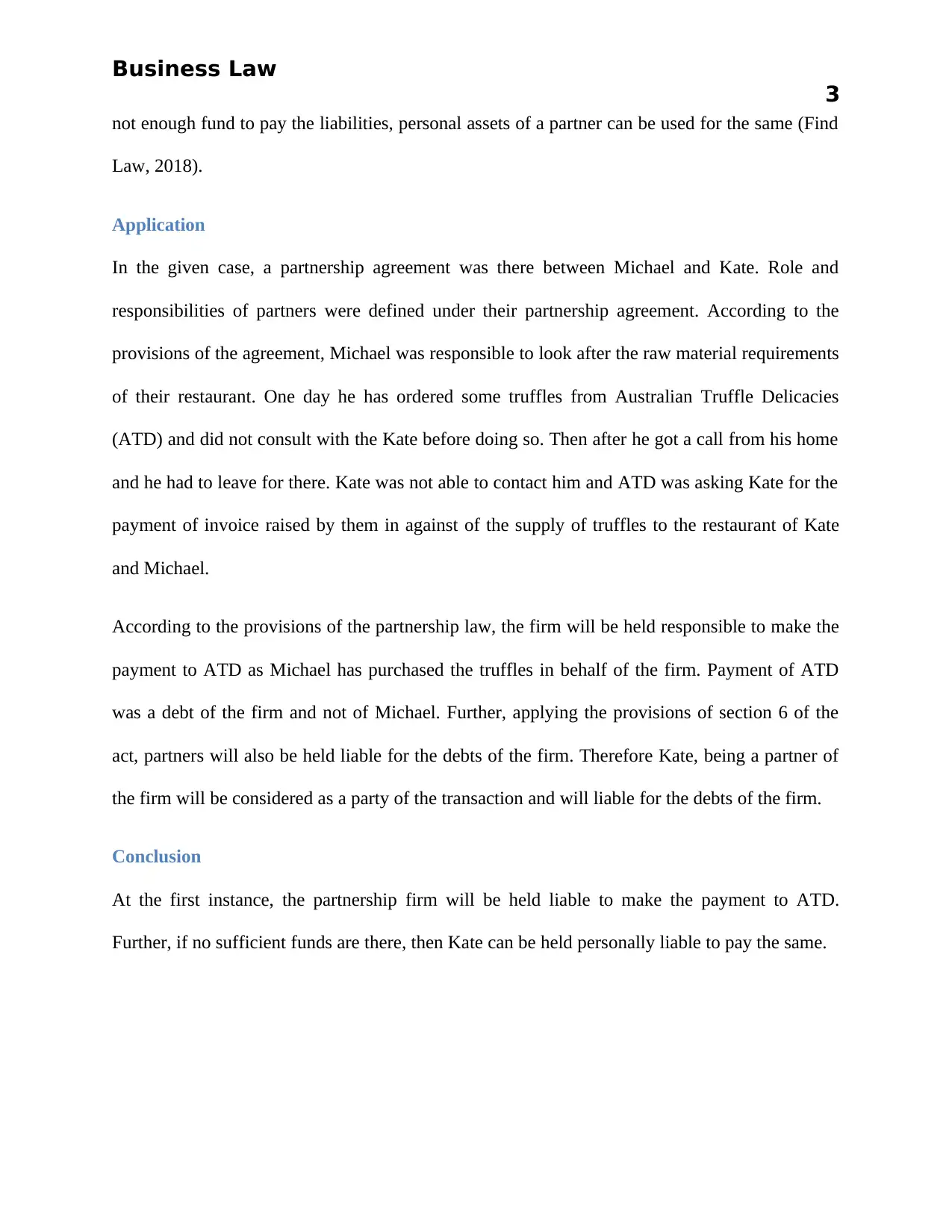
Business Law
3
not enough fund to pay the liabilities, personal assets of a partner can be used for the same (Find
Law, 2018).
Application
In the given case, a partnership agreement was there between Michael and Kate. Role and
responsibilities of partners were defined under their partnership agreement. According to the
provisions of the agreement, Michael was responsible to look after the raw material requirements
of their restaurant. One day he has ordered some truffles from Australian Truffle Delicacies
(ATD) and did not consult with the Kate before doing so. Then after he got a call from his home
and he had to leave for there. Kate was not able to contact him and ATD was asking Kate for the
payment of invoice raised by them in against of the supply of truffles to the restaurant of Kate
and Michael.
According to the provisions of the partnership law, the firm will be held responsible to make the
payment to ATD as Michael has purchased the truffles in behalf of the firm. Payment of ATD
was a debt of the firm and not of Michael. Further, applying the provisions of section 6 of the
act, partners will also be held liable for the debts of the firm. Therefore Kate, being a partner of
the firm will be considered as a party of the transaction and will liable for the debts of the firm.
Conclusion
At the first instance, the partnership firm will be held liable to make the payment to ATD.
Further, if no sufficient funds are there, then Kate can be held personally liable to pay the same.
3
not enough fund to pay the liabilities, personal assets of a partner can be used for the same (Find
Law, 2018).
Application
In the given case, a partnership agreement was there between Michael and Kate. Role and
responsibilities of partners were defined under their partnership agreement. According to the
provisions of the agreement, Michael was responsible to look after the raw material requirements
of their restaurant. One day he has ordered some truffles from Australian Truffle Delicacies
(ATD) and did not consult with the Kate before doing so. Then after he got a call from his home
and he had to leave for there. Kate was not able to contact him and ATD was asking Kate for the
payment of invoice raised by them in against of the supply of truffles to the restaurant of Kate
and Michael.
According to the provisions of the partnership law, the firm will be held responsible to make the
payment to ATD as Michael has purchased the truffles in behalf of the firm. Payment of ATD
was a debt of the firm and not of Michael. Further, applying the provisions of section 6 of the
act, partners will also be held liable for the debts of the firm. Therefore Kate, being a partner of
the firm will be considered as a party of the transaction and will liable for the debts of the firm.
Conclusion
At the first instance, the partnership firm will be held liable to make the payment to ATD.
Further, if no sufficient funds are there, then Kate can be held personally liable to pay the same.
Paraphrase This Document
Need a fresh take? Get an instant paraphrase of this document with our AI Paraphraser
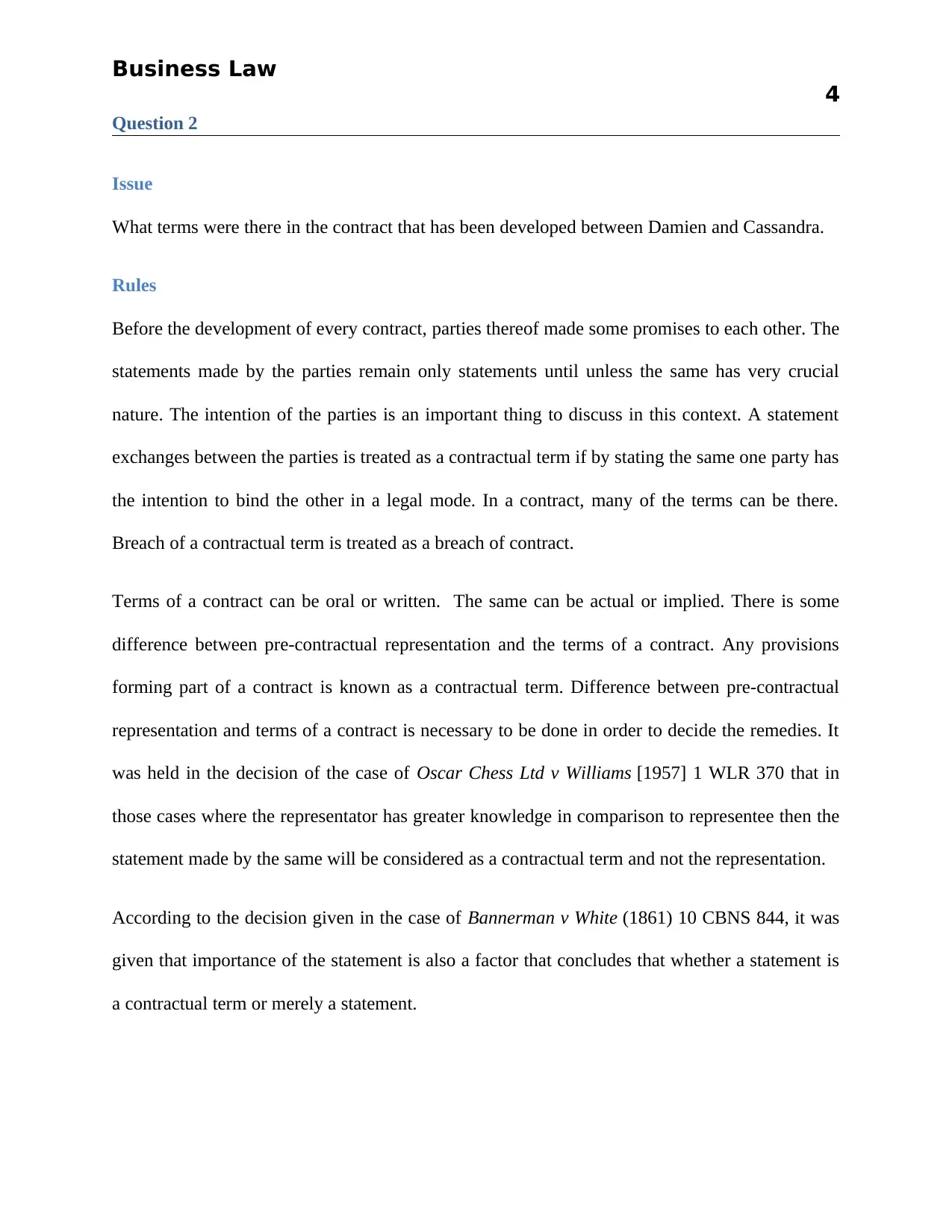
Business Law
4
Question 2
Issue
What terms were there in the contract that has been developed between Damien and Cassandra.
Rules
Before the development of every contract, parties thereof made some promises to each other. The
statements made by the parties remain only statements until unless the same has very crucial
nature. The intention of the parties is an important thing to discuss in this context. A statement
exchanges between the parties is treated as a contractual term if by stating the same one party has
the intention to bind the other in a legal mode. In a contract, many of the terms can be there.
Breach of a contractual term is treated as a breach of contract.
Terms of a contract can be oral or written. The same can be actual or implied. There is some
difference between pre-contractual representation and the terms of a contract. Any provisions
forming part of a contract is known as a contractual term. Difference between pre-contractual
representation and terms of a contract is necessary to be done in order to decide the remedies. It
was held in the decision of the case of Oscar Chess Ltd v Williams [1957] 1 WLR 370 that in
those cases where the representator has greater knowledge in comparison to representee then the
statement made by the same will be considered as a contractual term and not the representation.
According to the decision given in the case of Bannerman v White (1861) 10 CBNS 844, it was
given that importance of the statement is also a factor that concludes that whether a statement is
a contractual term or merely a statement.
4
Question 2
Issue
What terms were there in the contract that has been developed between Damien and Cassandra.
Rules
Before the development of every contract, parties thereof made some promises to each other. The
statements made by the parties remain only statements until unless the same has very crucial
nature. The intention of the parties is an important thing to discuss in this context. A statement
exchanges between the parties is treated as a contractual term if by stating the same one party has
the intention to bind the other in a legal mode. In a contract, many of the terms can be there.
Breach of a contractual term is treated as a breach of contract.
Terms of a contract can be oral or written. The same can be actual or implied. There is some
difference between pre-contractual representation and the terms of a contract. Any provisions
forming part of a contract is known as a contractual term. Difference between pre-contractual
representation and terms of a contract is necessary to be done in order to decide the remedies. It
was held in the decision of the case of Oscar Chess Ltd v Williams [1957] 1 WLR 370 that in
those cases where the representator has greater knowledge in comparison to representee then the
statement made by the same will be considered as a contractual term and not the representation.
According to the decision given in the case of Bannerman v White (1861) 10 CBNS 844, it was
given that importance of the statement is also a factor that concludes that whether a statement is
a contractual term or merely a statement.
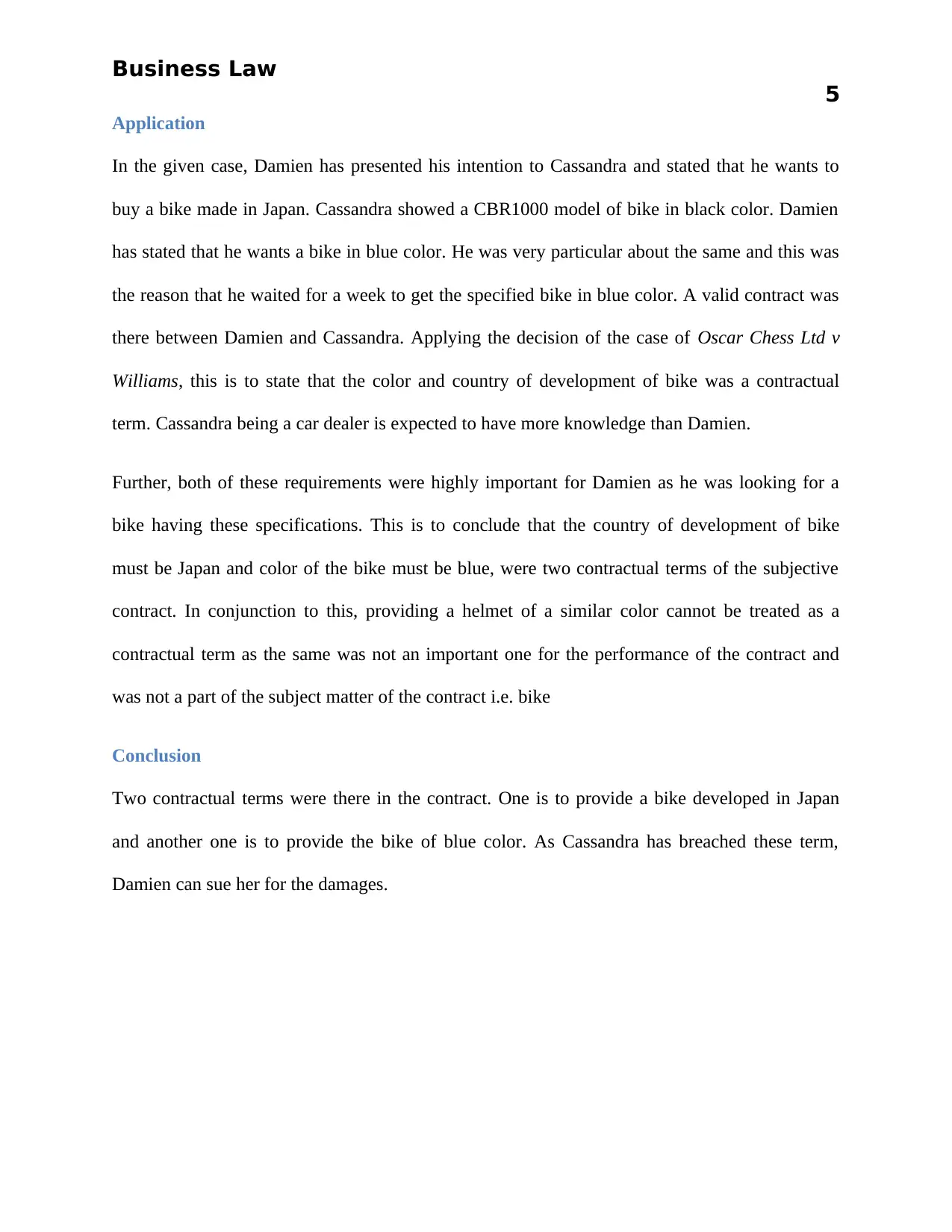
Business Law
5
Application
In the given case, Damien has presented his intention to Cassandra and stated that he wants to
buy a bike made in Japan. Cassandra showed a CBR1000 model of bike in black color. Damien
has stated that he wants a bike in blue color. He was very particular about the same and this was
the reason that he waited for a week to get the specified bike in blue color. A valid contract was
there between Damien and Cassandra. Applying the decision of the case of Oscar Chess Ltd v
Williams, this is to state that the color and country of development of bike was a contractual
term. Cassandra being a car dealer is expected to have more knowledge than Damien.
Further, both of these requirements were highly important for Damien as he was looking for a
bike having these specifications. This is to conclude that the country of development of bike
must be Japan and color of the bike must be blue, were two contractual terms of the subjective
contract. In conjunction to this, providing a helmet of a similar color cannot be treated as a
contractual term as the same was not an important one for the performance of the contract and
was not a part of the subject matter of the contract i.e. bike
Conclusion
Two contractual terms were there in the contract. One is to provide a bike developed in Japan
and another one is to provide the bike of blue color. As Cassandra has breached these term,
Damien can sue her for the damages.
5
Application
In the given case, Damien has presented his intention to Cassandra and stated that he wants to
buy a bike made in Japan. Cassandra showed a CBR1000 model of bike in black color. Damien
has stated that he wants a bike in blue color. He was very particular about the same and this was
the reason that he waited for a week to get the specified bike in blue color. A valid contract was
there between Damien and Cassandra. Applying the decision of the case of Oscar Chess Ltd v
Williams, this is to state that the color and country of development of bike was a contractual
term. Cassandra being a car dealer is expected to have more knowledge than Damien.
Further, both of these requirements were highly important for Damien as he was looking for a
bike having these specifications. This is to conclude that the country of development of bike
must be Japan and color of the bike must be blue, were two contractual terms of the subjective
contract. In conjunction to this, providing a helmet of a similar color cannot be treated as a
contractual term as the same was not an important one for the performance of the contract and
was not a part of the subject matter of the contract i.e. bike
Conclusion
Two contractual terms were there in the contract. One is to provide a bike developed in Japan
and another one is to provide the bike of blue color. As Cassandra has breached these term,
Damien can sue her for the damages.
⊘ This is a preview!⊘
Do you want full access?
Subscribe today to unlock all pages.

Trusted by 1+ million students worldwide
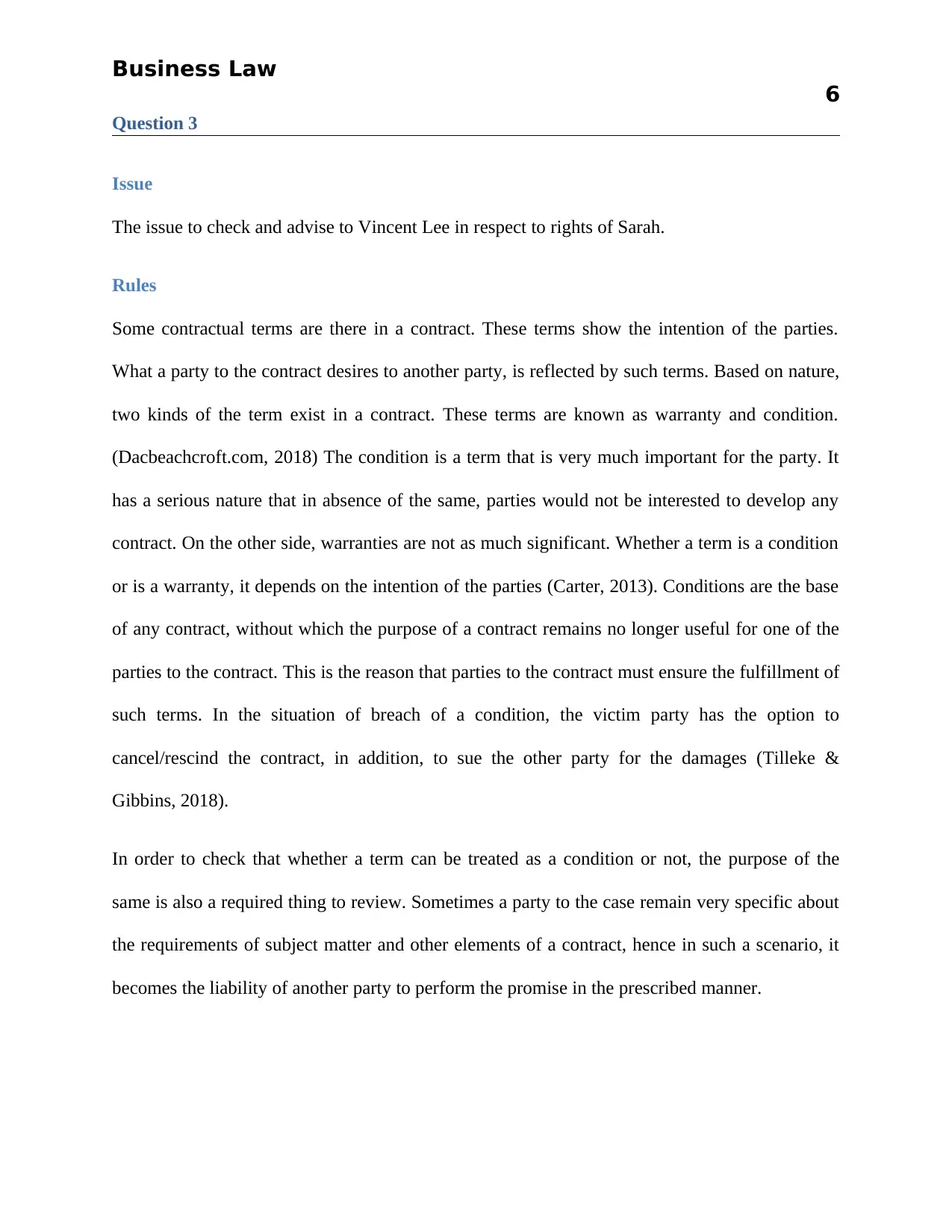
Business Law
6
Question 3
Issue
The issue to check and advise to Vincent Lee in respect to rights of Sarah.
Rules
Some contractual terms are there in a contract. These terms show the intention of the parties.
What a party to the contract desires to another party, is reflected by such terms. Based on nature,
two kinds of the term exist in a contract. These terms are known as warranty and condition.
(Dacbeachcroft.com, 2018) The condition is a term that is very much important for the party. It
has a serious nature that in absence of the same, parties would not be interested to develop any
contract. On the other side, warranties are not as much significant. Whether a term is a condition
or is a warranty, it depends on the intention of the parties (Carter, 2013). Conditions are the base
of any contract, without which the purpose of a contract remains no longer useful for one of the
parties to the contract. This is the reason that parties to the contract must ensure the fulfillment of
such terms. In the situation of breach of a condition, the victim party has the option to
cancel/rescind the contract, in addition, to sue the other party for the damages (Tilleke &
Gibbins, 2018).
In order to check that whether a term can be treated as a condition or not, the purpose of the
same is also a required thing to review. Sometimes a party to the case remain very specific about
the requirements of subject matter and other elements of a contract, hence in such a scenario, it
becomes the liability of another party to perform the promise in the prescribed manner.
6
Question 3
Issue
The issue to check and advise to Vincent Lee in respect to rights of Sarah.
Rules
Some contractual terms are there in a contract. These terms show the intention of the parties.
What a party to the contract desires to another party, is reflected by such terms. Based on nature,
two kinds of the term exist in a contract. These terms are known as warranty and condition.
(Dacbeachcroft.com, 2018) The condition is a term that is very much important for the party. It
has a serious nature that in absence of the same, parties would not be interested to develop any
contract. On the other side, warranties are not as much significant. Whether a term is a condition
or is a warranty, it depends on the intention of the parties (Carter, 2013). Conditions are the base
of any contract, without which the purpose of a contract remains no longer useful for one of the
parties to the contract. This is the reason that parties to the contract must ensure the fulfillment of
such terms. In the situation of breach of a condition, the victim party has the option to
cancel/rescind the contract, in addition, to sue the other party for the damages (Tilleke &
Gibbins, 2018).
In order to check that whether a term can be treated as a condition or not, the purpose of the
same is also a required thing to review. Sometimes a party to the case remain very specific about
the requirements of subject matter and other elements of a contract, hence in such a scenario, it
becomes the liability of another party to perform the promise in the prescribed manner.
Paraphrase This Document
Need a fresh take? Get an instant paraphrase of this document with our AI Paraphraser
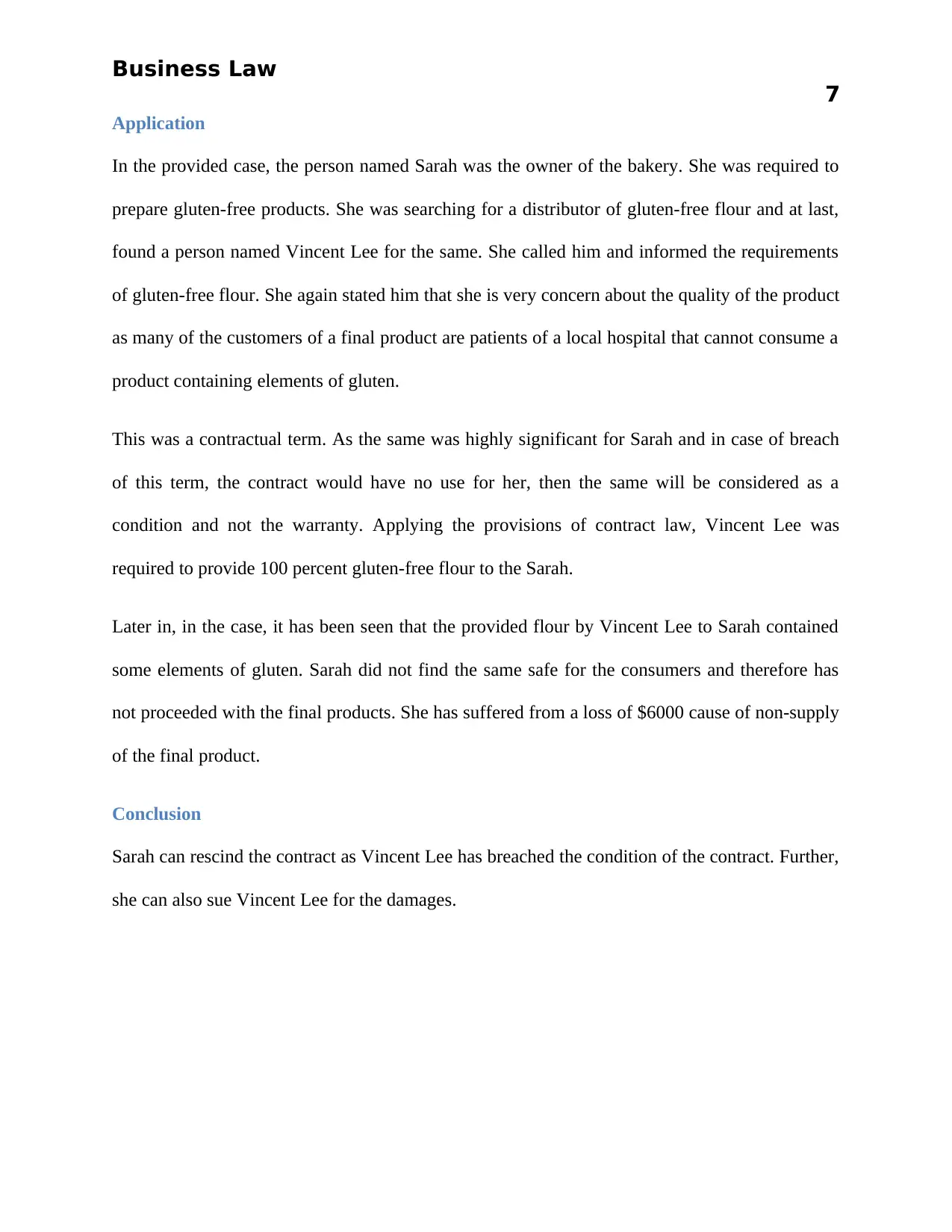
Business Law
7
Application
In the provided case, the person named Sarah was the owner of the bakery. She was required to
prepare gluten-free products. She was searching for a distributor of gluten-free flour and at last,
found a person named Vincent Lee for the same. She called him and informed the requirements
of gluten-free flour. She again stated him that she is very concern about the quality of the product
as many of the customers of a final product are patients of a local hospital that cannot consume a
product containing elements of gluten.
This was a contractual term. As the same was highly significant for Sarah and in case of breach
of this term, the contract would have no use for her, then the same will be considered as a
condition and not the warranty. Applying the provisions of contract law, Vincent Lee was
required to provide 100 percent gluten-free flour to the Sarah.
Later in, in the case, it has been seen that the provided flour by Vincent Lee to Sarah contained
some elements of gluten. Sarah did not find the same safe for the consumers and therefore has
not proceeded with the final products. She has suffered from a loss of $6000 cause of non-supply
of the final product.
Conclusion
Sarah can rescind the contract as Vincent Lee has breached the condition of the contract. Further,
she can also sue Vincent Lee for the damages.
7
Application
In the provided case, the person named Sarah was the owner of the bakery. She was required to
prepare gluten-free products. She was searching for a distributor of gluten-free flour and at last,
found a person named Vincent Lee for the same. She called him and informed the requirements
of gluten-free flour. She again stated him that she is very concern about the quality of the product
as many of the customers of a final product are patients of a local hospital that cannot consume a
product containing elements of gluten.
This was a contractual term. As the same was highly significant for Sarah and in case of breach
of this term, the contract would have no use for her, then the same will be considered as a
condition and not the warranty. Applying the provisions of contract law, Vincent Lee was
required to provide 100 percent gluten-free flour to the Sarah.
Later in, in the case, it has been seen that the provided flour by Vincent Lee to Sarah contained
some elements of gluten. Sarah did not find the same safe for the consumers and therefore has
not proceeded with the final products. She has suffered from a loss of $6000 cause of non-supply
of the final product.
Conclusion
Sarah can rescind the contract as Vincent Lee has breached the condition of the contract. Further,
she can also sue Vincent Lee for the damages.
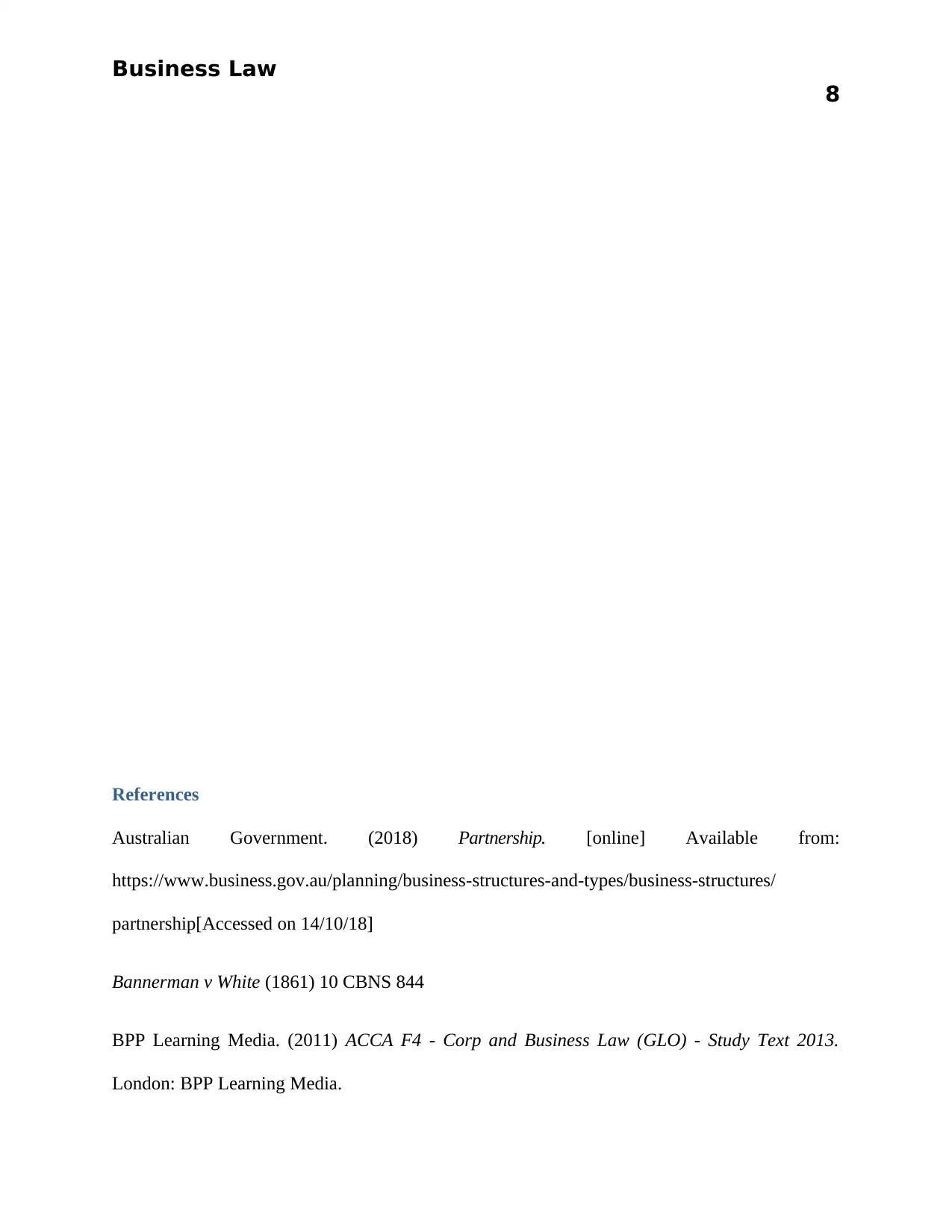
Business Law
8
References
Australian Government. (2018) Partnership. [online] Available from:
https://www.business.gov.au/planning/business-structures-and-types/business-structures/
partnership[Accessed on 14/10/18]
Bannerman v White (1861) 10 CBNS 844
BPP Learning Media. (2011) ACCA F4 - Corp and Business Law (GLO) - Study Text 2013.
London: BPP Learning Media.
8
References
Australian Government. (2018) Partnership. [online] Available from:
https://www.business.gov.au/planning/business-structures-and-types/business-structures/
partnership[Accessed on 14/10/18]
Bannerman v White (1861) 10 CBNS 844
BPP Learning Media. (2011) ACCA F4 - Corp and Business Law (GLO) - Study Text 2013.
London: BPP Learning Media.
⊘ This is a preview!⊘
Do you want full access?
Subscribe today to unlock all pages.

Trusted by 1+ million students worldwide
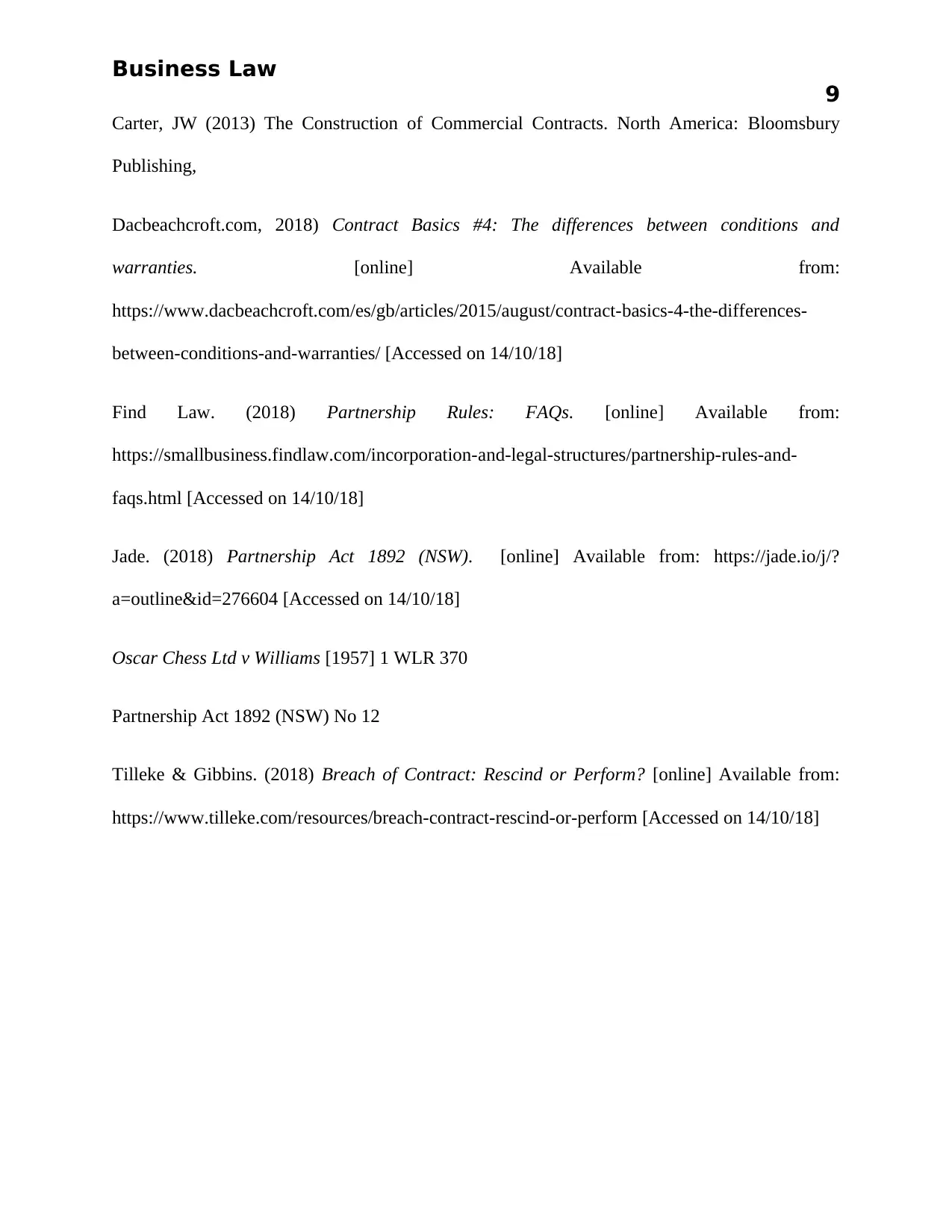
Business Law
9
Carter, JW (2013) The Construction of Commercial Contracts. North America: Bloomsbury
Publishing,
Dacbeachcroft.com, 2018) Contract Basics #4: The differences between conditions and
warranties. [online] Available from:
https://www.dacbeachcroft.com/es/gb/articles/2015/august/contract-basics-4-the-differences-
between-conditions-and-warranties/ [Accessed on 14/10/18]
Find Law. (2018) Partnership Rules: FAQs. [online] Available from:
https://smallbusiness.findlaw.com/incorporation-and-legal-structures/partnership-rules-and-
faqs.html [Accessed on 14/10/18]
Jade. (2018) Partnership Act 1892 (NSW). [online] Available from: https://jade.io/j/?
a=outline&id=276604 [Accessed on 14/10/18]
Oscar Chess Ltd v Williams [1957] 1 WLR 370
Partnership Act 1892 (NSW) No 12
Tilleke & Gibbins. (2018) Breach of Contract: Rescind or Perform? [online] Available from:
https://www.tilleke.com/resources/breach-contract-rescind-or-perform [Accessed on 14/10/18]
9
Carter, JW (2013) The Construction of Commercial Contracts. North America: Bloomsbury
Publishing,
Dacbeachcroft.com, 2018) Contract Basics #4: The differences between conditions and
warranties. [online] Available from:
https://www.dacbeachcroft.com/es/gb/articles/2015/august/contract-basics-4-the-differences-
between-conditions-and-warranties/ [Accessed on 14/10/18]
Find Law. (2018) Partnership Rules: FAQs. [online] Available from:
https://smallbusiness.findlaw.com/incorporation-and-legal-structures/partnership-rules-and-
faqs.html [Accessed on 14/10/18]
Jade. (2018) Partnership Act 1892 (NSW). [online] Available from: https://jade.io/j/?
a=outline&id=276604 [Accessed on 14/10/18]
Oscar Chess Ltd v Williams [1957] 1 WLR 370
Partnership Act 1892 (NSW) No 12
Tilleke & Gibbins. (2018) Breach of Contract: Rescind or Perform? [online] Available from:
https://www.tilleke.com/resources/breach-contract-rescind-or-perform [Accessed on 14/10/18]
1 out of 10
Related Documents
Your All-in-One AI-Powered Toolkit for Academic Success.
+13062052269
info@desklib.com
Available 24*7 on WhatsApp / Email
![[object Object]](/_next/static/media/star-bottom.7253800d.svg)
Unlock your academic potential
Copyright © 2020–2026 A2Z Services. All Rights Reserved. Developed and managed by ZUCOL.




